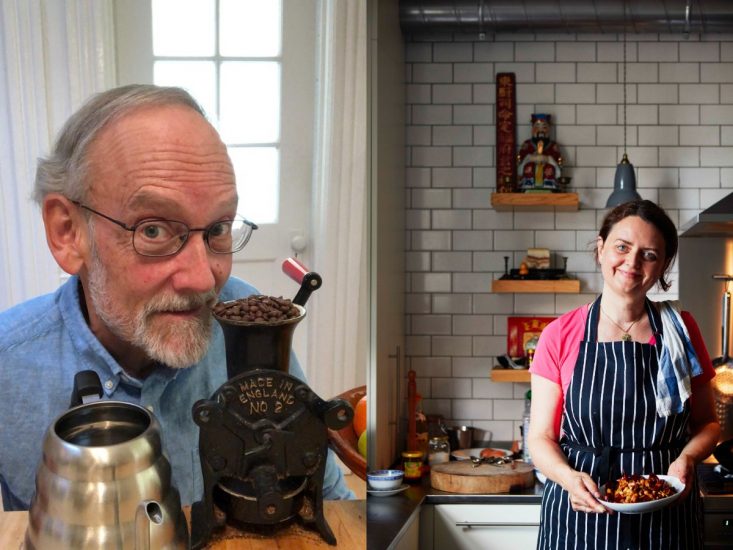
Kitchen Table No. 5 – digest from the chatline
Smells Nasty and Nice: How they guide us in the Kitchen and at the Table
Harold McGee, former OSFC Trustee and organiser of our Young Chef’s Programme and pioneer Symposiast Fuchsia Dunlop were welcomed at the Kitchen Table by Symposium Trustee Naomi Duguid to talk about Harold’s new book, Nose Dive: a Field Guide to the last World’s Smells. While neither needs any introduction, Harold says he’s been writing for more than four decades about the science of food and cooking: where our foods come from, what they are and what they’re made of, and how cooking transforms them. His masterwork, On Food and Cooking, first published in 1984, translated technical food science for practical use in the kitchen by home-cooks, professional chefs and everyone who’s ever wondered why mayonnaise splits.
Fuchsia, the first westerner to train as a chef at the Sichuan Institute of Higher Cuisine in Chengdu, modestly describes herself as a cook and food-writer specialising in Chinese cuisine. However, the publication of Sichuan Cookery (published in the United States as Land of Plenty) changed the way Chinese regional cooking was perceived and was immediately acclaimed as a classic. Other work that’s collected all the glittering prizes includes Land of Fish and Rice and her autobiographical Shark’s Fin and Sichuan Pepper.
While we don’t record the discussions themselves (what’s said at the kitchen table stays at the kitchen table), here follows a digest of the lively contributions to the chatline sorted into subjects:
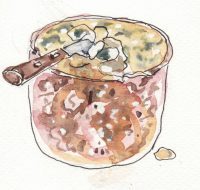
On identifying osmocosms*
* olfactory ambience made up of many thousands of tiny molecules.
Walk into any Chinese grocery store in the US and the osmocosm immediately changes. Walk into a temple in India and the osmocosm is a bouquet.
Those who bask regularly in the osmososm of the Neal’s Yard Dairy in London know there’s nothing like their Stilton cheese. Does the osmocosm of where you are interact with specific molecules you might be able to smell? Essentially, would the same glass of wine smell different in Paris than in Beijing?
I love how Harold wrote about mitti attar in the book; takes me back to Lahore!
We live 50 yards from St James Gate, Guinness, in Dublin: marries well with a coffee in the morning – malty, toasty, roasty.
Decades ago I always remember the smell of cow dung on arrival at Delhi airport – from the 90’s onwards never got the same smell on arrival. Is the ‘deodorised’ more of a western world thing? In South Asia, South East Asia we grow up with varied osmocosms. When my kids return home they take a deep breath in and say “Ah, it still smells of home here”.
On communicating the identity of smells
We [already] know that if a child is not exposed to certain (linguistic) sounds at an early age, they are unable to detect them in adulthood (which is in large part responsible for accents in second languages); do you suppose the same thing is true aromatically…are we effectively training in cultural anosmias?
Olfactometers are fascinating: I worked with a flavour house when I was trading orange juice….we had a crop destroyed of Shamouti oranges destined for juice from the Northern Hemisphere…the machine enabled us to buy Valencias when the Southern Hemisphere cropped and adjusted the elements to make them taste like Shaamouti’s.
Hops in beer produce variations: you can find tropical aromas in hops that were not grown in the tropics. [There were] fruity notes in my fermentation experiments (Chinese rice wine and sake), lots of fruity aromas and tastes in fermented starches too.
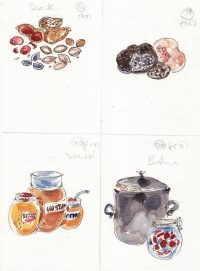
Comparing one smell to another
Fuchsia’s memoir has interesting observations on Chinese views of disgusting aromas in ‘Western food.’ Cheese and smelly socks (obviously.) Petrol and riesling. This almost sounds like the miasma theory of odour equals disease. Durian and smelly socks! How about the ammonia in fermented shark blubber? A lot of Westerners seem to have trouble with the lime, mineral, basic, bleach-y smell that comes from thousand year old eggs in certain preparations, but my Chinese-American father cultivated me to love it (usually).
I love durian ice cream, but a friend had to spit it out, finding it so repulsive. I have very sensitive sense of smell and I couldn’t cope with durian ice cream! Skate wings and ammonia. What is appalling to some is delicious to others – I’ve adored durian since I first tried it as a kid in Malaysia despite going up in UK.
My understanding is that époisses cheese is banned on public transportation in Paris. We had ripening Munster cheese in our hotel room in Alsace and the Alsatian maids moved it outdoors on the window sill!
Kimchi undergoing fermentation is quite an aroma as well. Akhuni from Nagaland India apparently smells as if something has died – haven’t tasted/smelt akhuni myself…there’s a movie on Netflix, ‘Axone’. I love Kimchi smell. I think kimchi is like Fuschia’s cheese – when you anticipate the flavour you relate to it more favourably!
Smells nasty
People have distorted impressions of what smells ‘pleasant’. Harold is making me remember a very powerful experience, which was visiting a place in India where ceremonial cremations were taking place: the smell was overwhelmingly familiar, and it basically smelled like roasting meat – very disturbing. I had the same experience in Bali. I went to a cremation ceremony in a small village, and it smelled like a huge kebab feast, but with the thought that it was actually the funeral subject, I did not even feel like eating the grilled corn being sold around.
Yes, we’re actually quite perceptive to the smell of fear and sometimes make decisions subconsciously based on “smelling” fear. Mark Schatzker in Dorito Effect talks about how artificial flavourings trick our body into seeking and never finding satiety. Which means we’re never satiated – it’s an interesting analysis.
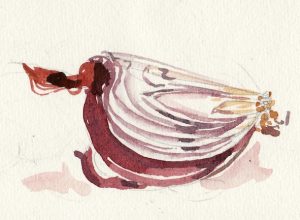
On the anatomy of smell
Is smell acquired – or are we born with some specific ones? What is the role of Jacobson’s organ [an olfactory canal in the nasal mucosa that’s highly developed in reptiles and vestigial in humans] in feeling and understanding smells? Can you develop your ability to feel the smells by training your Jacobson? Surely one can train smell sensitivity just as one can train one’s taste sensitivity?
There’s also the interesting character of violet in cocktails mixing, where a sip mutes the smell/taste of violet for the next few seconds. How many smells can the average human being identify /detect?
In China they are very sensitive to dairy – many of my Chinese relatives say westerners smell like dairy. The Japanese also used to say that Westerners were “bata-kusai” or “butter-smelling”.
About the butter smell- when my mother-in-law was growing up in Taiwan and the USA was sending clothing to the country to offer aid, they would always have to wash the clothes as they found they always smelled of milk- and as there was little milk drinking, it smelled slightly sour and very weird to them.
On losing the sense of smell
There is so much literature on the devastating effect of losing one’s sense of smell…as with so many things, we only realise the true value of something when we lose it. I lost my sense of smell and taste four years ago due to a bout of sepsis.
I lost my sense of smell when I split up with my first boyfriend – do you think there is a connection with stress and emotions in terms of our ability to smell?
Covid-related loss of smell/taste in my experience has been strange…different from any other loss of smell/taste I experienced that was more like a dial usually set at 10 is down to 2 and is slowly inching back up as you recover…as observed by others, the Covid recovery is nonlinear, episodic.
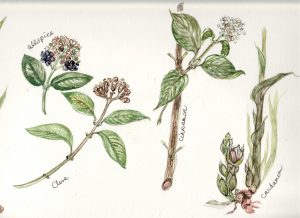
On the practical value of smells
I mostly conduct my research in Japan where one’s personal smells are important -wearing perfume or after shave for example might by some seem an invasion of other people’s Personal Smell Space.
What about methods of animal slaughter and how that is supposed to change both the meat flavor and aroma when later cooked (depending on mercifulness, ritual, and the animal’s relaxation, suffering, or surprise during slaughter)?
We think of smell as separate from the other senses but some chemicals cause pain….The emotion of disgust is theorized to be a “pathogen” avoiding emotion, and when we feel disgust there are areas in our brains that are activated, and one of them has to do with the smell-processing area of the brain. Context is everything…and disgust is subjective. Do we smell differently if our emotional state is heightened?
On using your nose in cooking
Frying instruction to achieve a certain smell – love it! Well, you have to use all your senses to cook well: I always have my nose over the pan or pot! What is so important in Indian cooking is sensing a certain aroma to know if it’s done…
Chinese, too….Using your nose is almost essential as you cook…the only way to monitor as you cook is if you get a whiff.
Fuchsia’s instinct for describing the smell that you are trying to achieve is wonderful – giving an instruction toward a result, like a degree of browning or a final temperature, instead of a guess about time.
Victor Hazan mentioned that Marcella could smell salt. Smell molecules are more friendly with oil, rather than water…when you add salt, it’s like adding lots of free chemical charges, so you make the food more like water than oil, so that forces out the aroma molecules into the air so we can smell them, but they’ve left the food.
When an animal is killed the body discharges adrenalin – that changes the taste of the meat.
As a mushroom is dried and cells are damaged, the ample proteins and amino acids are liberated and interact with the sugars, especially in porcini. That is a very helpful practical tip: so do not use boiling hot water on the dried shiitake?
The enhancing effect of chicken broth on your rehydrating mushrooms may be the additive effect of the IMP in the chicken broth with the glutamate in the chicken broth, especially if you use the stacking broth in the finished dish…see Umami by Mouritsen & Styrbaek.
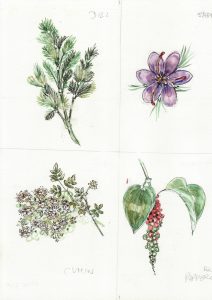
On the chemistry of smells
Iron helps generate a lot of chemical reactions: when heated it’s interacting and generating lots of compounds. “Umami” is a taste descriptor but is there an equivalent “smell”?
I understand that texture can suggest flavor? I have heard that we may be attracted to a mate through smell, we can perceive people that can augment genetic qualities we lack to improve our chances down the road – would perfume confound this?
Our everyday lives used to be full of organic smells — now mostly chemical — does that change us? My mother owns a lot of dry-clean-only clothing and she dry cleans it once it has an odor or stain: every now and then, I used to borrow clothing from her, but I noticed I’d always feel incredibly anxious…I realized that she’s an anxious person and I could subtly smell her fear, and it made me afraid, too.
Speaker photo credits: Harold McGee and Fuchsia Dunlop
Paintings by Elisabeth Luard
